Deckingman's new printer
-
Impressive !!!
-
@deckingman Looks quite massive!
Here in germany the openbuild extrusion costs a lot more than standard extrusion. Therefor I'd have only use the v-slot where needed.
But in the UK it might be different, I guess. -
@o_lampe said in Deckingman's new printer:
@deckingman Looks quite massive!
My Wife .......... "I thought you said it was going to be smaller than the old one"
Me ..................."It is. The power supplies will be in a drawer underneath instead of sticking out the back, and there will only be one filament spool which will sit on the top rather than hang off this side".
My Wife ........."That's obviously some meaning of the term "smaller" that I wasn't aware of........".
I didn't tell her that the frame is now 640mm x 620mm rather than 600mm x 600mm.
 The overall height is about 1400mm rather than 1800mm (but I didn't mention that because there could be 2 or 3 Kg roll of filament added to the top).
The overall height is about 1400mm rather than 1800mm (but I didn't mention that because there could be 2 or 3 Kg roll of filament added to the top).Here in germany the openbuild extrusion costs a lot more than standard extrusion. Therefor I'd have only use the v-slot where needed.
But in the UK it might be different, I guess.Most of the extrusion came from the old printer so it's all "upcycled". The only extrusion I bought new was four 4040 legs which cost me £118. But I wanted them anodised black to match the rest and cut to length (1350mm). Here in the UK, if you want extrusion cut to length and black anodised, there isn't much difference in price. I bought them from a UK supplier called "Ooznest" which I use a lot and who offer free next working day delivery for orders over £100.
"Tee" nuts, open build wheels, spacers and pulleys were all "upcycled" too as well as all the bolts and fixings, so they haven't cost me anything. I did have to buy some aluminium stock to make the gantry plates, idler mounts, motor mounts, belt tensioners etc. But I've "upcycled" the lead screws and their associated plates as well as the Z motor mount, the Z axis guides and the complete bed assembly (not shown in the pictures). I have plenty of motors as well as a Duet main board and the kind people at Duet donated a tool board. I also have the PSUs and DC UPS but I had to buy some new back up batteries. The big expense was the Bondtech LGX Ace extruder + Slice Engineering Mosquito combo. They did give me a small discount but that was wiped out by having to pay 20% UK VAT when it came into the country plus UPS charged me another £13 for them to take that VAT and pass it on to the government. If I'd bought a Chinese clone, there are no UK import fees which pi**es me off greatly but that's another story....
-
My Wife .......... "I thought you said it was going to be smaller than the old one"
Me ..................."It is. The power supplies will be in a drawer underneath instead of sticking out the back, and there will only be one filament spool which will sit on the top rather than hang off this side".
My Wife ........."That's obviously some meaning of the term "smaller" that I wasn't aware of........".
ROFL .... I can so here this conversation in my mind !!
UPS charged me another £13 for them to take that VAT and pass it on to the government. If I'd bought a Chinese clone, there are no UK import fees which pi**es me off greatly but that's another story....
Count yourself lucky - over here, UPS would be MUCH more brutal.
-
Just uploaded part 7 - https://youtu.be/XLLdK7Bu464
In this video, I explain how a (retired) mechanical engineer gets the build plate level and "tram" such that no compensation of any sort (mesh or otherwise) is needed, nor any further adjustments unless the machine is disassembled.
Here are a few more pics if watching YT videos isn't "your thing".
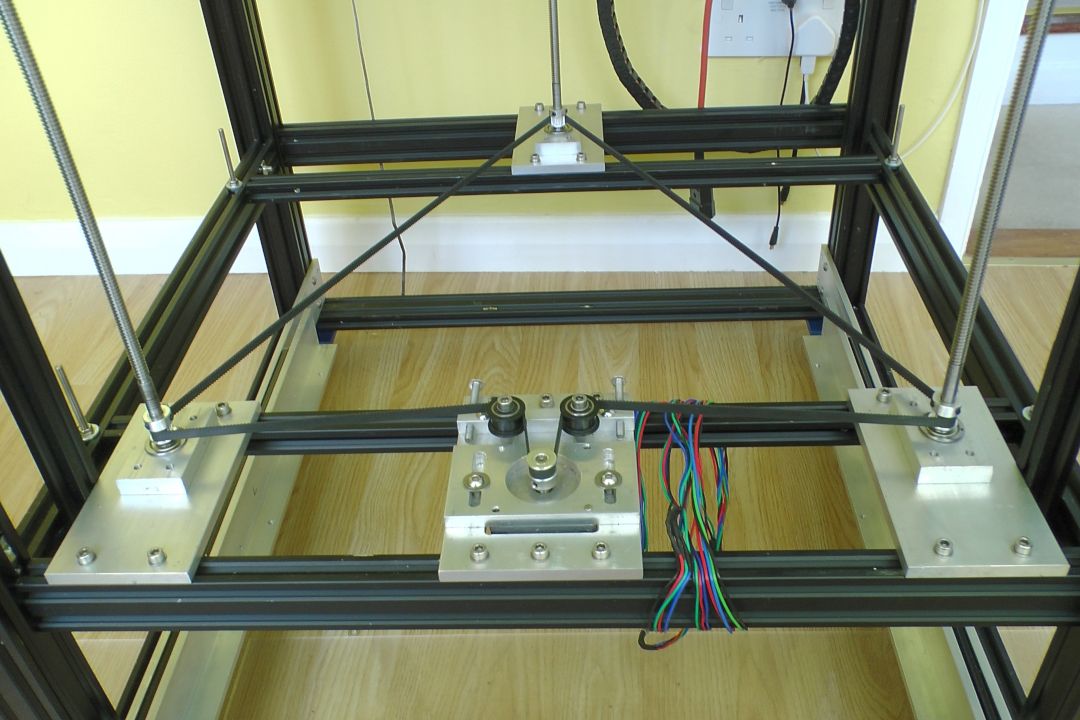
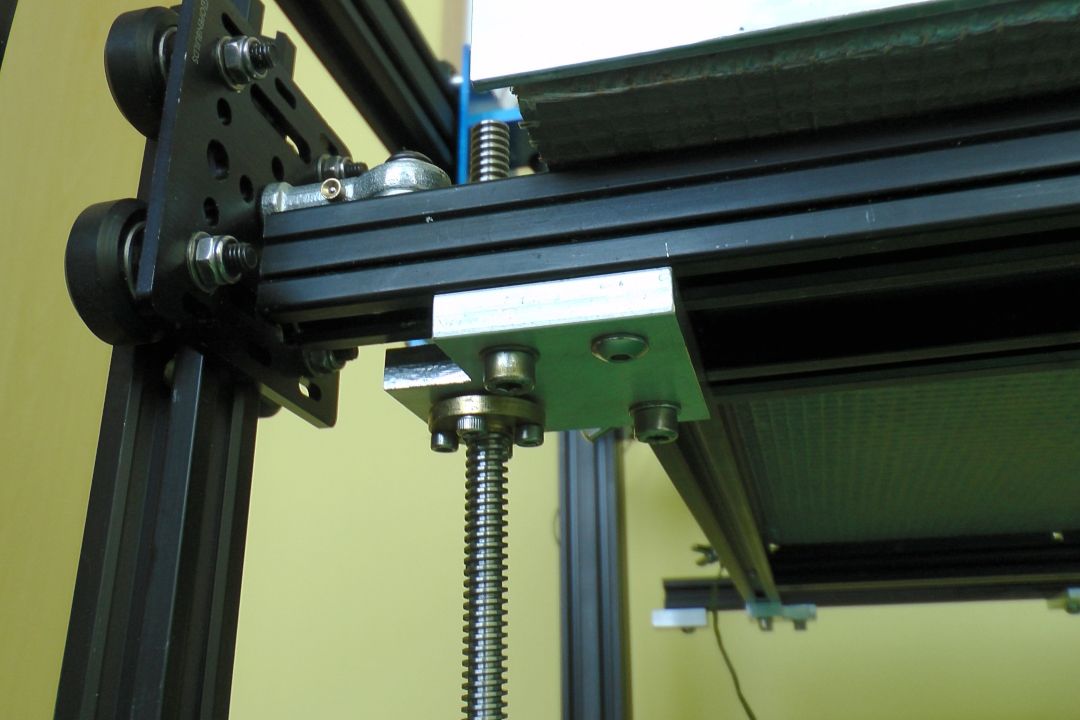
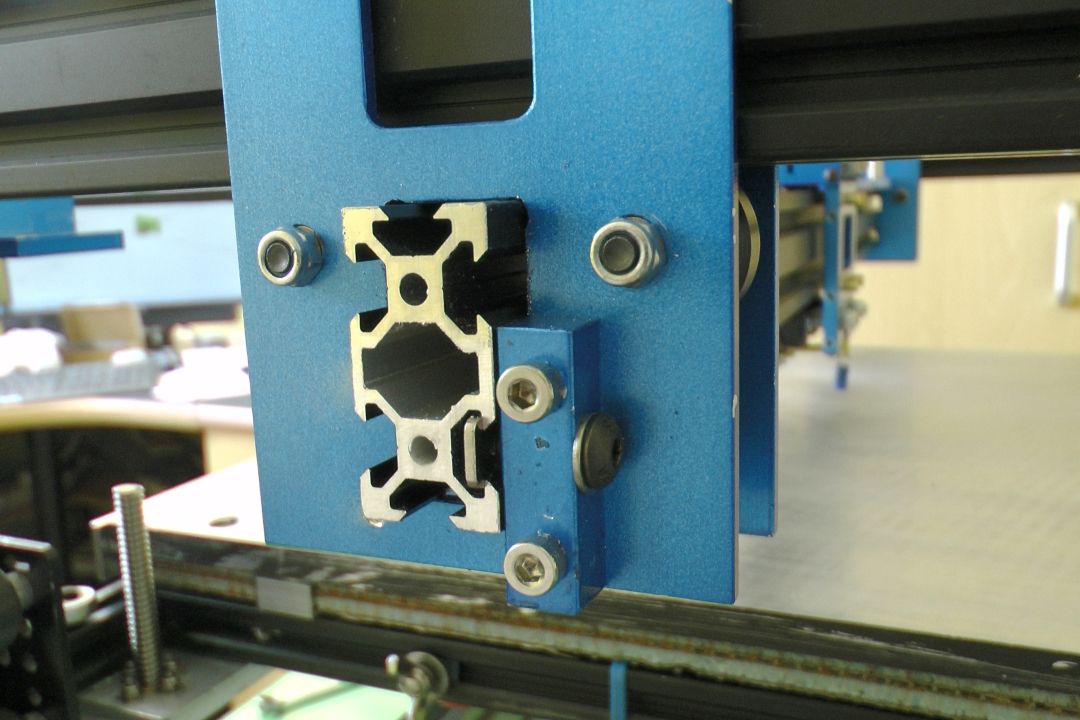
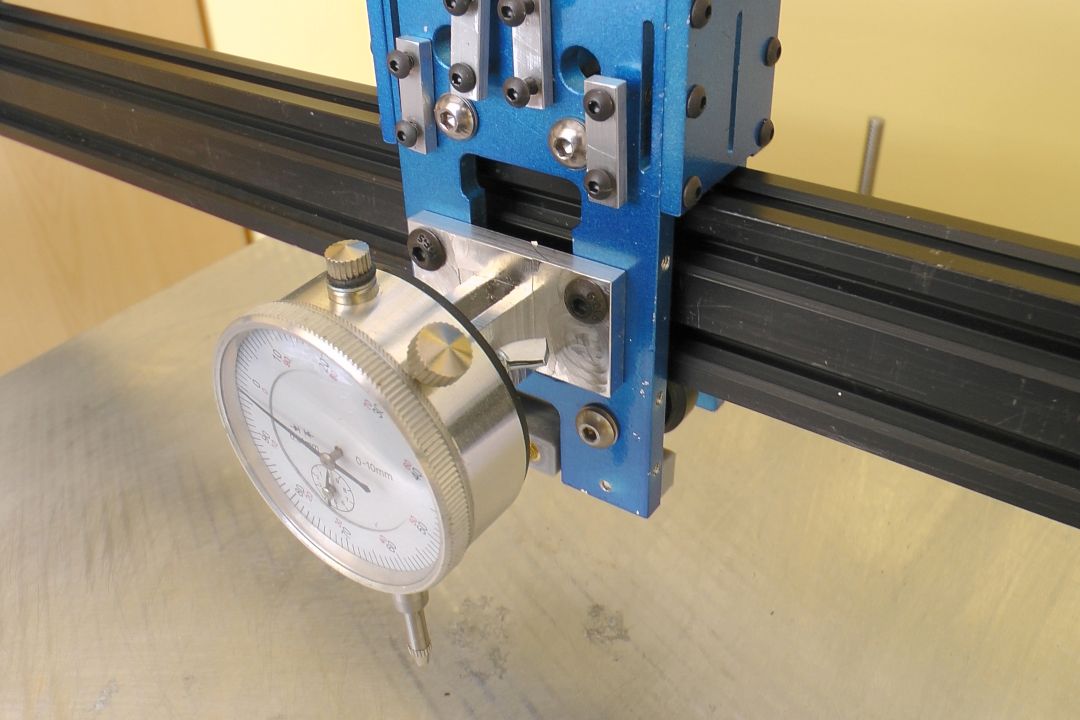
-
Part 8 is out now. It's mostly just about me installing the various electronics bits and pieces including the DC UPS and batteries in my pull out drawer. https://youtu.be/74u2AluoZgo
Probably boring stuff for members of this forum but there is a bit about keeping the two series connected back-up batteries equalised and protecting them from over-discharging which might be of interest.
Here is a quick picture of the installation so far.
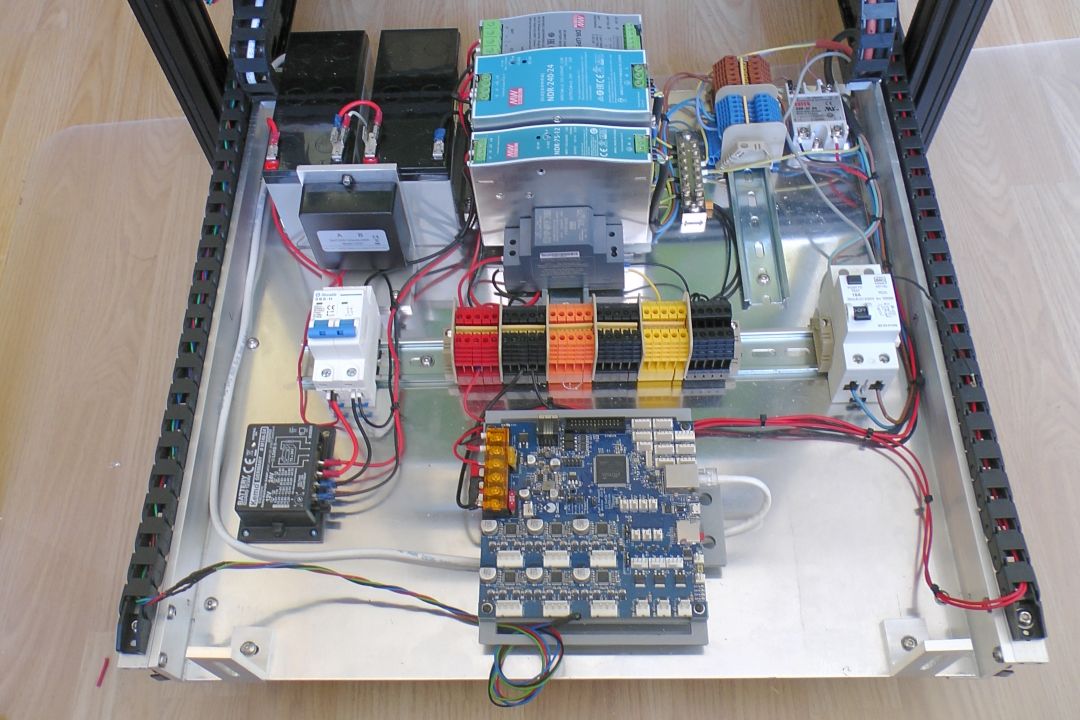
-
This post is deleted! -
awesome build. i'm always interested in the electronics, specifically what type of DIN mounted contactors and components people use. i see the 24v and 12v power supply. but hard to see the details on other components.
-
@RogerPodacter What details would you like to know that aren't clear from the pictures in the YT video? I only mentioned the new parts I bought as everything else is carried over from my old build which I have previously documented. I'm happy to provide more info if you tell me what you want to know.
-
It's nearly finished.
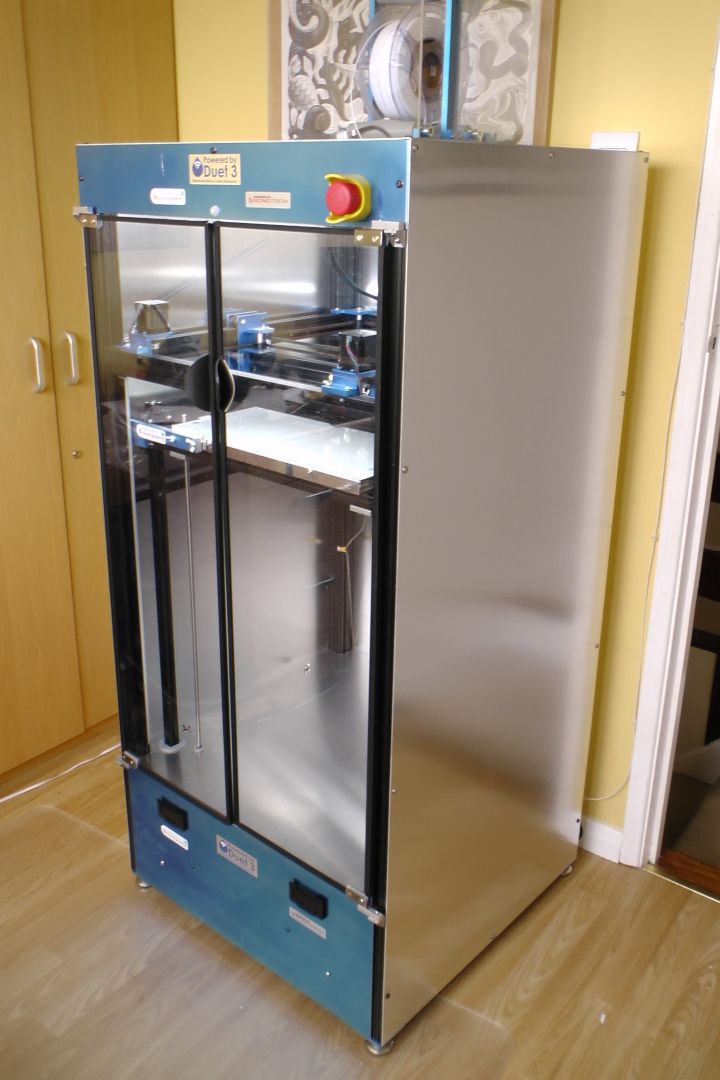
-
@deckingman very professional looking
-
-
@jens55 said in Deckingman's new printer:
OMG !!!! A thing of beauty!
Thank you kind sir!. The panels certainly give it the Wife Acceptance Factor. They are just 1.5mm aluminium which was the cheapest thing I could find that wouldn't look too bad. They do rattle a bit though, so I've ordered some self adhesive "ant-rattle" tape (essentially a sort of adhesive backed foam strip about 1.5mm thick). I'll take the panels off, stick that tape around the frame, then bolt them back on. I've also ordered some sound deadening material - the sort of stuff used on motor homes and vans, so I'll stick that to the inside of the panels too.
I've documented the build on my YT channel. If you haven't already been following along, here is a link to the playlist https://www.youtube.com/playlist?list=PLMt2DqJCk4V95a5sZzkpzvL-vM4G_JMxI
There will be more pics in part 13 which I'll upload when I've finished putting it all together.
-
@deckingman
Flasher than a rat with a gold tooth!
-
This looks amazing. Well thought out and neat.
I'm very interested in your electronics/wiring, as I'm just about to start my mod's to my Tronxy X5SA pro (corexy).
Your DC Distrubution panel. Are each sections all connected with a busbar or something, ie the 5 x Red 24v terminals all connected together?
Can you remember what these terminals blocks are (make and model)?
Dizzwold.
-
@Dizzwold The terminal blocks are just standard DIN rail blocks. I can't remember the make and model but they weren't anything special - just some cheap ones off Amazon I think. I figured they would be OK for this low voltage/low current application. Yes each set of blocks are connected together using bus bars. But I ran out of bus bars so the last block of 0V ones on the right are connected together using link wires on the rear terminals. I've edited the picture that you likely saw on my YT video with labels to show the bus bars and link wires. Here you go.......
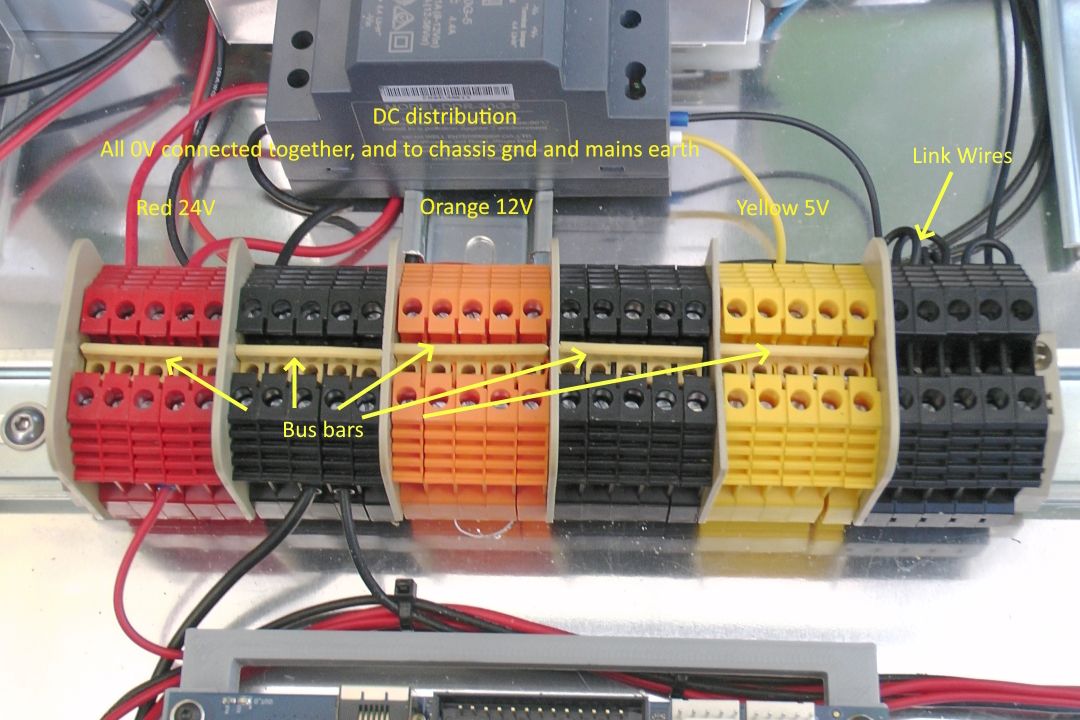
EDIT. Not all DIN rail terminals have provision for bus bars. They aren't strictly necessary but if you don't have to use link wires, they effectively double the number of terminals available to connect other things.